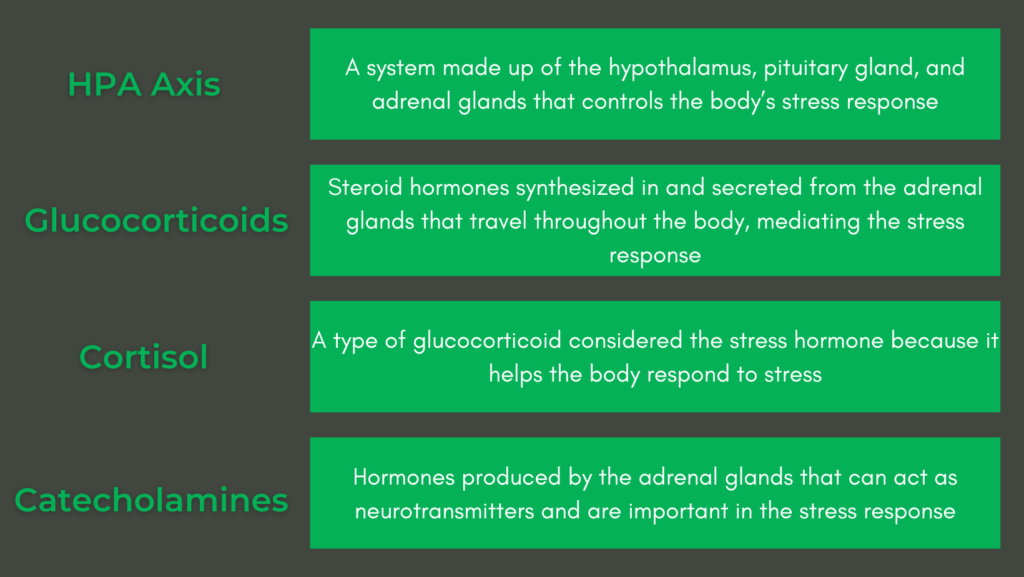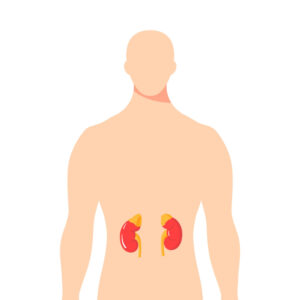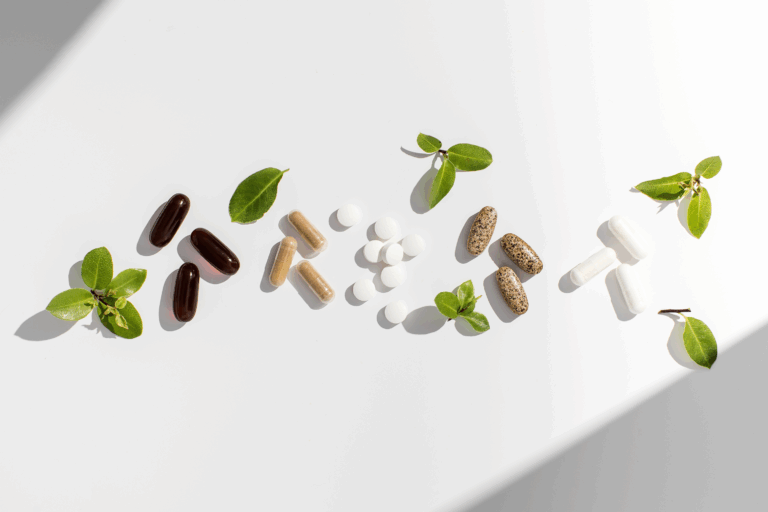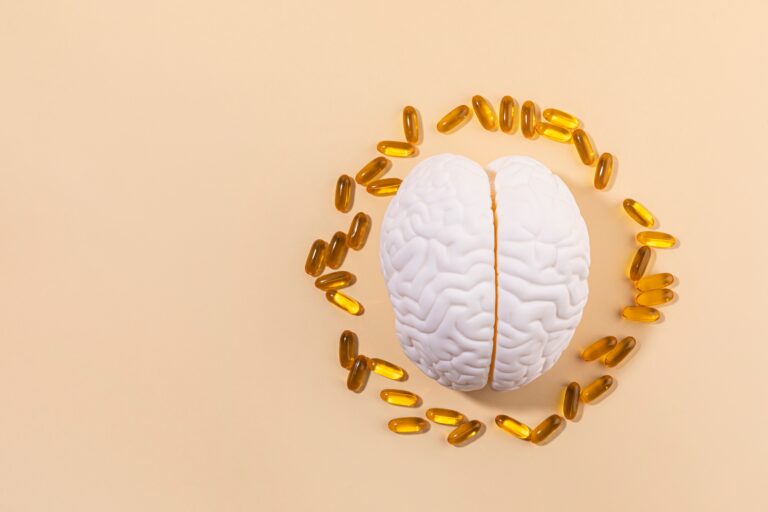Nutrients and Herbs for Adrenal Health
Nutrients and Herbs for Adrenal Health
Maintaining adrenal health is critical to the body’s stress response. Consuming nutrients and herbs that target the brain, HPA axis, and stress systems can greatly enhance the body’s adrenal glands and stress response. Additionally, consuming these nutrients and herbs together may provide a synergistic effect.
Adrenal Gland Physiology
The adrenal glands are located on top of the kidneys and produce important molecules for the body including steroid hormones, such as glucocorticoids and mineralocorticoids, as well as catecholamines, including epinephrine and norepinephrine. Steroid hormones are critical for many functions in the body including growth, metabolism, homeostasis and reproduction, while catecholamines are involved in the body’s fight or flight response.1 The adrenal glands are also a central part of the HPA axis (Hypothalamic-Pituitary-Adrenal axis), which is responsible for the stress response, primarily through the actions of cortisol.
The adrenal glands are involved in many other functions of the body including regulating fluid balance, influencing blood glucose levels, and mediating inflammatory and immune responses.
The adrenal glands are involved in many other functions of the body including regulating fluid balance, influencing blood glucose levels, and mediating inflammatory and immune responses. Mineralocorticoids produced by the adrenal glands direct the kidneys to increase sodium reabsorption and potassium excretion which influences fluid balance in the body.1 Additionally, cortisol from the adrenal glands can suppress the immune system, alter glucose and lipid metabolism, and increase insulin resistance and fat deposition in the body.1 Glucocorticoids and catecholamines produced by the adrenal glands regulate inflammation by changing expression of cytokines and pro-inflammatory genes and function as activators of immune cells, enhancing the immune response.2,3 The adrenal glands, as part of the HPA axis, also maintain elements of the body’s circadian rhythm through cortisol secretion.

Health Conditions Connected to Adrenal Health
Because the adrenal glands secrete compounds that regulate a variety of complex tasks, their proper functioning is critical. Any changes to the adrenal glands, or other components of the HPA axis, can have rippling effects throughout the body, including chronic stress, resulting in elevated cortisol levels and HPA axis hyperactivation.
The adrenal glands are especially critical to healthy mood, sleep, and stress regulation, primarily through the HPA axis. For example, the HPA axis and the chemicals it produces regulate the sleep-wake cycle.4 Disrupted sleep or excessive stress can lead to hyperactivation of the HPA axis, resulting in increased levels of glucocorticoids. Elevated glucocorticoids can cause dysfunction throughout the body, altering metabolism and contributing to disease risk.4 Similarly, anxiety can activate the HPA axis to stimulate cortisol release to help the body adapt, but improper or chronic activation can lead to exhaustion and fatigue, poor sleep, and brain fog. Adrenal insufficiency, also called Addison’s disease, can show up as a variety of psychological signs including anxiety.5
Nutrients that Support Adrenal Glands
Several micronutrients support adrenal function, both directly (modulating parts of the HPA axis) and indirectly (positively regulating sleep, stress, and mood).
Vitamins C and A
Vitamin C is a necessary cofactor in catecholamine synthesis and can also normalize cortisol levels during stress.6,7 Vitamin A, specifically retinoic acid, may influence adrenal gland physiology, including interacting with glucocorticoid signaling.8 Retinoids from vitamin A are also important for the hypothalamus and pituitary glands, as demonstrated by a preclinical study that found vitamin A deficiency resulted in increased HPA axis activity but a delayed cortisol response, possibly due to the ability of vitamin A to modulate cortisol receptor expression.8,9 Adequate intake of vitamin C and A will supply the adrenal glands and HPA axis with required cofactors and signaling molecules needed to carry out their functions.
B vitamins
Several B vitamins are important for adrenal health and support processes that involve the adrenal glands. Thiamin (B1), pantothenic acid (B5), and vitamin B12 may help with the rapid production of hormones necessary for the stress response, and thiamin may be able to protect the adrenal glands from functional exhaustion.7,10 Similarly, original evidence indicates that adrenal function may be impaired under conditions of vitamin B5 deficiency. Preclinical studies have demonstrated that pantothenic acid is able to enhance adrenal function and may downregulate hypercortisolism found in high stress conditions.7 Finally, vitamin B12 helps keep cortisol secretions in sync with the body’s circadian rhythm.7
Supporting stress, sleep, and mood pathways also supports adrenal health by preserving its function and preventing over-exertion and eventual fatigue of the adrenal gland. B vitamins are especially important in these pathways due to their roles in cellular processes that contribute to brain health, including regulating emotions and sleep.11 Niacinamide, a form of vitamin B3, can enhance sleep, including REM sleep and sleep efficiency, possibly by allowing for greater conversion of tryptophan into serotonin.7 Vitamin B6 is an important cofactor for this reaction as well as for the synthesis of several neurotransmitters including serotonin.7 Vitamin B12 can help increase sleep quality and shift the circadian rhythm when it veers off track by enhancing light sensitivity.7
Magnesium
Because inadequate magnesium levels in the brain can result in neurological and behavioral disorders, it is especially critical to correct any known magnesium deficiency.12-14 Magnesium also plays a role in modulating mood and stress and can influence HPA axis activity.12 In clinical trials, supplementation with magnesium in individuals with suboptimal levels decreased stress and increased sleep time and melatonin levels.15,16
Maintaining adequate consumption of several B vitamins and magnesium, especially in individuals that are deficient, may benefit measures of mood, stress, and sleep, resulting in reduced drain on the adrenal glands and HPA axis. While anxiety and mood disorders are too complex to treat with a single B vitamin, studies are demonstrating promising results that B vitamin supplementation with magnesium can benefit measures of stress.11,17 Similarly, a combination of thiamin, vitamin B6, and vitamin C significantly improved glucocorticoid function and normalized the circadian rhythm of the adrenal glands.7
Herbs for Adrenal Health
Many of the herbs that support adrenal health fall into the category of adaptogens. Adaptogens herbs that improve the non-specific response to stress and promote recovery.7,18

Panax ginseng
The mechanisms are not fully understood, but Panax ginseng (Korean ginseng) appears to work on both the adrenal glands and the HPA axis.7,18 Current research indicates that Korean ginseng helps with the acute stress response, possibly via saponins that can stimulate cortisol production.7,18 It may also improve the sensitivity of the HPA axis to cortisol.7,18 This can help avoid long term activation of the HPA axis which leads to hypercortisolism and adrenal fatigue. One clinical trial in humans indicated that when Korean ginseng was added to a multivitamin, individuals subjected to high physical and mental stress experienced a strong adaptogenic or anti-stress effect.19
Eleutherococcus senticocus
Eleutherococcus senticocus (Siberian ginseng) has demonstrated anti-stress effects in both preclinical and clinical models.7,18 Siberian ginseng may be able to increase the body’s ability to handle adverse physical conditions, improve mental performance, and enhance the quality of work performed under stressful conditions.7 Siberian ginseng may be able to reduce heart rate and reduce blood pressure in individuals with even mild stress, indicating a positive role in stress adaptation.20
Withania somnifera
Ashwagandha (Indian ginseng; scientific name Withania somnifera) is a popular adaptogen that exerts anti-stress effects in the body, including counteracting the effects of stress and improving anxiety-like behaviors in preclinical models.7 The anti-stress actions of ashwagandha are not fully clear, but it is currently thought that the components of ashwagandha called withanolides contribute to its effects. Withanolides are a sterol structure and may mimic the actions of glucocorticoids.7 In addition to its ability to oppose acute stress, ashwagandha has also been found to decrease the effects of chronic stress, including reversing stress-induced immunosuppression.7
Glycyrrhiza glabra
Glycyrrhiza glabra, also known as licorice, supports adrenal health through its glucocorticoid-like activity.7 Glycyrrhiza may be able to act synergistically with cortisol, sparing its use which allows it to stay active in the body for longer.7,18 Glycyrrhizin, found in Glycyrrhiza root, is structurally similar to corticoids and can bind to glucocorticoid and mineralocorticoid receptors, producing a similar but reduced cellular response.18 Some individuals should exercise caution when taking Glycyrrhiza because of its potentially cortisol-enhancing effects, but it is considered safe and effective for most people.18
Rhodiola rosea
Rhodiola rosea is thought to work on many components of the central nervous system although it also supports the adrenal glands. Rhodiola is able to influence the concentration and activity of neurotransmitters in the brain, including norepinephrine, which is produced in the adrenal glands.7 Rhodiola can also prevent catecholamine release, preventing depletion induced by acute stress.7 In a clinical trial investigating the effects of Rhodiola rosea in individuals with stress-related fatigue, the herb was able to significantly improve concentration, decrease stress-related fatigue, and reduce salivary cortisol levels.21 Rhodiola may be especially important in protecting cardiac function secondary to stress.18
Anxiety-reducing herbs
Other herbs also support adrenal health by reducing anxiety. Several herbs are able to modulate neurotransmitter metabolism, which can have effects on sleep, stress, and mood issues, including lemon balm (Melissa officinalis), kava kava (Piper methysticum), and valerian (Valeriana officinalis).7 Additionally, an echinacea extract decreased anxiety in a double-blind, placebo-controlled study.22
- Dutt, M., Wehrle, C.J., Jialal, I. Physiology, Adrenal Gland. [Updated 2022 May 8]. In: StatPearls [Internet]. Treasure Island (FL): StatPearls Publishing; 2022 Jan-. Available from: https://www.ncbi.nlm.nih.gov/books/NBK537260/.
- Cruz-Topete, D., Cidlowski, J.A. (2015). One Hormone Two Actions: Anti- and Pro-inflammatory Effects of Glucocorticoids. Neuroimmunomodulation, 22:20.
- Deak, T. (2008). Immune Cells and Cytokine Circuits: Toward a Working Model for Understanding Direct Immune-to-Adrenal Communication Pathways. Endocrinology, 149(4):1433.
- Hirotsu, C., Tufik, S., Andersen, M.L. (2015). Interactions between sleep, stress, and metabolism: From physiological to pathological conditions. Sleep Sci, 8(3):143.
- Anglin, R.E., Rosebush, P.I., Mazurek, M.F. (2006). The neuropsychiatric profile of Addison’s disease: revisiting a forgotten phenomenon. J Neuropsychiatry Clin Neurosci, 18(4):450.
- Patak, P., Willenberg, H.S., Bornstein, S.R. (2004). Vitamin C is an important cofactor for both adrenal cortex and adrenal medulla. Endocr Res, 30(4):871.
- Head, K.A., Kelly, G.S. (2009). Nutrients and botanicals for treatment of stress: adrenal fatigue, neurotransmitter imbalance, anxiety, and restless sleep. Altern Med Rev, 14(2):114.
- Brossaud, J., Pallet, V., Corcuff, J.-B. (2017). Vitamin A, endocrine tissues and hormones: interplay and interactions. Endocr Connect, 6:R121.
- Marissal-Arvy, N., Hamiani, R., Richard, E., Moisan, M.-P., Pallet, V. (2013). Vitamin A regulates hypothalamic-pituitary-adrenal axis status in LOU/C rats. J Endocrinol, 219(1):21.
- Veličković, D., Veljković, M. (2014). The study of vitamins B1, B6, and B12 effects on adrenal cortex adaptation by monitoring some enzyme systems in rats trained by swimming. Acta Medica Medianea, 53(2):33.
- Young, L.M., Pipingas, A., White, D.J., Gauci, S., Scholey, A. (2019). A Systematic Review and Meta-Analysis of B Vitamin Supplementation on Depressive Symptoms, Anxiety, and Stress: Effects on Healthy and ‘At-Risk’ Individuals. Nutrients, 11:2232.
- Sartori, S.B., Whittle, N., Hetzenauer, A., Singewald, N. (2012). Magnesium deficiency induces anxiety and HPA axis dysregulation: Modulation by therapeutic drug treatment. Neuropharmacology, 62:304.
- Xue, W., You, J., Su, Y., Wang, Q. (2019). The Effect of Magnesium Deficiency on Neurological Disorders: A Narrative Review Article. Iran J Public Health, 48:
- Morris, M.E. (1992). Brain and CSF magnesium concentrations during magnesium deficit in animals and humans: neurological symptoms. Magnes Res, 5:
- Pouteau, E., Kabir-Ahmadi, M., Noah, L., Mazur, A., Dye, L., Hellhammer, J., Pickering, G., Dubray, C. (2018). Superiority of magnesium and vitamin B6 over magnesium alone on severe stress in healthy adults with low magnesemia: A randomized, single-blind clinical trial. Plos One, 13(12): e0208454.
- Abbasi, B., Kimiagar, M., Sadeghniiat, K., Shirazi, M.M., Hedayati, M., Rashidkhani, B. (2012). The effect of magnesium supplementation on primary insomnia in elderly: A double-blind placebo-controlled clinical trial. J Res Med Sci, 17:1161-1169.
- Armborst, A., Metzner, C., Alteheld, B., Bitterlich, N., Rösler, D., Siener, R. (2018). Impact of a Specific Amino Acid Composition with Micronutrients on Well-Being in Subjects with Chronic Psychological Stress and Exhaustion Conditions: A Pilot Study. Nutrients, 10:551.
- Kelly, G.S. (1999). Nutritional and botanical interventions to assist with the adaptation to stress. Altern Med Rev, 4(4):249.
- Marasco, A.C., Ruiz, R.V., Villagomez, A.S., Infante, C.B. (1996). Double-blind study of a multivitamin complex supplemented with ginseng extract. Drugs Exp Clin Res, 22(6):323.
- Facchinetti, F., Neri, I., Tarabusi, M. (2002). Eleutherococcus senticosus reduces cardiovascular response in healthy subjects: a randomized, placebo-controlled trial. Stress Health, 18:11.
- Olsson, E.M., von Scheele, B., Panossian, A.G. (2009). A randomized, double-blind, placebo-controlled, parallel-group study of the standardized extract SHR-5 of the roots of Rhodiola rosea in the treatment of subjects with stress-related fatigue. Planta Med, 75:105.
- Haller, J., Krecsak, L., Zámbori, J. (2020). Double-blind placebo controlled trial of the anxiolytic effects of a standardized Echinacea extract. Phytother Res, 34(3):660.








